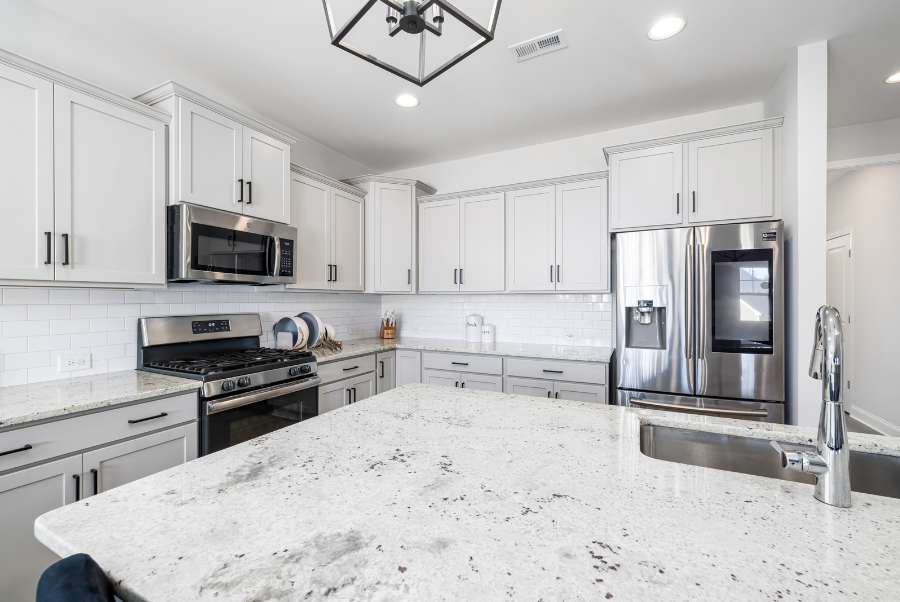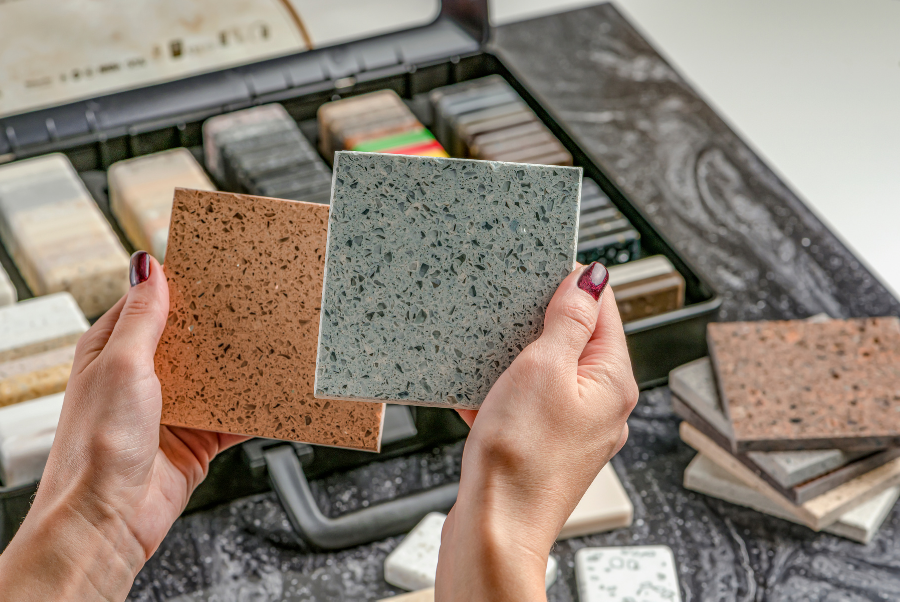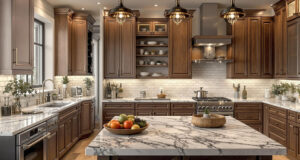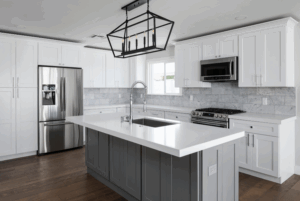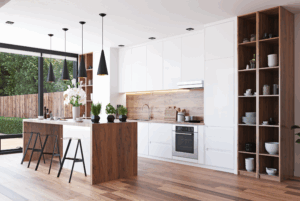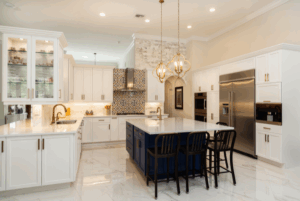Granite countertops have remained a top choice for homeowners looking to add both beauty and durability to their kitchens. Known for their natural elegance, resilience, and timeless appeal, granite has been a staple in modern and traditional kitchen designs alike. Whether you’re considering a full kitchen remodel or just upgrading your countertops, understanding the granite countertops pros and cons is crucial in making an informed decision.
At Michael Nash Design, Build & Homes, we specialize in high-quality kitchen remodeling in Fairfax, VA, helping homeowners transform their spaces with premium materials like granite countertops. In this guide, we’ll explore the key benefits and drawbacks of granite countertops so you can determine if they are the right fit for your home.
Why Granite Countertops?
Granite is a natural stone that has been used in home design for centuries. Its rich textures, unique patterns, and high durability make it a favorite among homeowners. However, no material is perfect, and granite has its setbacks as well. This article will explore 7 key facts about granite countertops’ pros and cons, ensuring you have all the details needed to make the best choice for your kitchen.
Granite Countertops Pros and Cons: Durability and Strength
Pros of Granite Countertops: Durability and Strength
One of the primary reasons homeowners choose granite countertops is their exceptional durability. As a natural stone, granite is formed under intense heat and pressure, making it one of the hardest materials available for kitchen countertops. Below are the key benefits of granite’s strength and longevity:
✔️ Scratch and Heat Resistance
- Granite ranks high on the Mohs hardness scale, meaning it is highly resistant to scratches from knives, cookware, and daily kitchen activities.
- Unlike softer countertop materials like laminate or solid surface, granite does not get easily scratched, ensuring a pristine look for years.
- Heat resistance is another major advantage. You can place hot pots and pans directly on the surface without fear of damage. Unlike materials like quartz, which can scorch from high heat, granite can withstand extreme temperatures without warping or discoloration.
✔️ Longevity: Built to Last for Decades
- With proper maintenance and sealing, granite countertops can last 50 years or more, making them a long-term investment.
- Unlike wood or laminate, which wear down over time, granite retains its natural beauty and resists fading even after decades of use.
- Many homeowners report that granite countertops outlast the kitchen itself, making them a valuable feature for resale purposes.
Cons of Granite Countertops: Durability and Strength
While granite countertops are incredibly strong, they are not completely indestructible. Here are some of the downsides to consider:
❌ Potential for Chipping
- While granite is extremely hard, it is not flexible like quartz or solid surface materials. If a heavy object, such as a cast-iron skillet, falls on the countertop’s edge, it may cause chipping.
- Chips and cracks typically occur around high-use areas such as sink edges and corners.
- Unlike engineered stones, granite cannot “bounce back” from impact damage, making proper handling essential.
❌ Professional Repairs Needed
- Repairing a chipped or cracked granite countertop is not a DIY-friendly job. Professional stone restoration experts are often needed to properly repair and blend the damage.
- Some chips can be filled with resin or epoxy, but larger cracks may require replacing an entire section of the countertop, which can be costly.
- Unlike quartz, where small chips may go unnoticed, granite’s natural veining and patterns may make repairs more visible, depending on the severity of the damage.
Durability and Strength: Key Takeaway
✅ Granite countertops offer unmatched durability, resisting scratches, heat, and wear over time.
❌ However, they are prone to chipping along the edges and require professional repairs if damage occurs.
Granite remains an excellent choice for homeowners who prioritize long-lasting materials and are willing to invest in proper care and maintenance.
Granite Countertops Pros and Cons: Aesthetic Appeal
Pros of Granite Countertops: Aesthetic Appeal
Granite countertops are renowned for their stunning visual appeal and ability to transform any kitchen into a luxurious and elegant space. Unlike synthetic materials, granite is a natural stone, offering unique beauty that cannot be replicated. Here are the key advantages of granite’s aesthetic appeal:
✔️ Unique Patterns: No Two Slabs Are Alike
- Every slab of granite is one of a kind, featuring distinct veining, colors, and patterns that add a touch of exclusivity to your kitchen.
- Unlike engineered surfaces like quartz, which have repetitive patterns, granite ensures that no two countertops will ever look exactly the same.
- Available in a wide range of colors, from classic black and white to vibrant shades of blue, green, and red, granite complements any kitchen style, from traditional to modern.
✔️ Enhances Home Value and Resale Appeal
- Granite countertops are a highly desirable feature among homebuyers, often making a home easier to sell and increasing perceived home value.
- Real estate experts agree that upgrading to granite can provide a high return on investment (ROI), especially in competitive markets like Fairfax, VA.
- According to a 2023 Zillow report, homes with high-end countertops like granite tend to sell faster and at higher prices than homes with outdated surfaces.
Case Study: A Fairfax, VA homeowner remodeled their kitchen with granite countertops and saw a 12% increase in their home’s appraisal value within a year.
Cons of Granite Countertops: Aesthetic Appeal
While granite offers breathtaking beauty, it also comes with a few drawbacks regarding consistency and design flexibility:
❌ Inconsistency in Appearance
- Since granite is a natural material, there may be color variations and pattern differences between the sample you select in-store and the final installed countertop.
- Some homeowners may love this natural uniqueness, while others may be disappointed if their slab looks drastically different than expected.
- If you’re looking for a uniform appearance, engineered stone like quartz may be a better option.
❌ Limited Control Over Patterns
- Matching granite slabs across multiple sections (e.g., L-shaped kitchens or large islands) can be difficult because patterns and veining may not align seamlessly.
- Homeowners who prefer a perfectly symmetrical or consistent look may struggle to find a granite slab that meets their expectations.
- Unlike man-made materials like solid surface countertops, where patterns are designed to match, granite’s natural randomness makes achieving a cohesive design more challenging.
Aesthetic Appeal: Key Takeaway
✅ Granite countertops offer unmatched natural beauty, with unique patterns that enhance kitchen elegance and home value.
❌ However, their natural variations may lead to inconsistencies, making it difficult to achieve a uniform appearance.
Granite is an excellent choice for homeowners who appreciate natural stone’s uniqueness and are comfortable with slight variations in pattern and color.
Granite Countertops Pros and Cons: Maintenance Requirements
Pros of Granite Countertops: Maintenance Requirements
One of the reasons homeowners love granite countertops is that they are relatively easy to maintain compared to other natural stone surfaces. When properly cared for, granite remains stunning and functional for decades. Here’s why maintenance is a major advantage:
✔️ Stain Resistance with Proper Sealing
- Granite is naturally resistant to stains, but it does require sealing to maintain this property.
- Once sealed, liquids like wine, coffee, and oil won’t penetrate the surface, preventing long-term discoloration.
- Unlike porous materials like marble, which easily absorb liquids, sealed granite creates a protective barrier that repels spills and bacteria.
- A well-sealed granite countertop is also food-safe, making it a hygienic choice for busy kitchens.
✔️ Simple Cleaning Routine
- Unlike high-maintenance materials, granite countertops only require mild soap, warm water, and a soft cloth to keep them clean.
- No need for harsh chemicals—acidic cleaners like vinegar or bleach can damage the sealant, but a mild dish soap does the trick.
- A simple daily wipe-down removes crumbs, spills, and bacteria, ensuring your kitchen stays clean and fresh.
- Many homeowners prefer granite over materials like wood or concrete, which require intensive care and specialized cleaning products.
Cons of Granite Countertops: Maintenance Requirements
While granite countertops are easy to clean, they aren’t maintenance-free. Here are the key drawbacks:
❌ Regular Sealing Necessary
- Granite is a porous material, meaning it can absorb liquids if not sealed properly.
- To maintain its stain-resistant properties, granite countertops need to be sealed at least once a year—sometimes more, depending on usage.
- How to check if your granite needs sealing:
- Pour a few drops of water on the surface.
- If the water beads up, your seal is intact.
- If the water soaks in within a few minutes, it’s time to reseal.
| Granite Sealing Guide | Frequency |
| Light-use kitchens | Every 1-2 years |
| High-traffic kitchens | Annually |
| Commercial use | Every 6 months |
- Skipping sealing can lead to permanent stains, requiring professional restoration.
❌ Porosity Concerns: Risk of Staining
- Unsealed granite can absorb liquids like oil, wine, or citrus juice, leading to dark stains or etching.
- Lighter-colored granite is more prone to staining compared to darker slabs.
- If stains set in, removal requires a baking soda and hydrogen peroxide poultice, which can take hours or even days to lift the discoloration.
- Oil-based stains (like cooking grease) are particularly tricky and often require professional deep cleaning.
Maintenance Requirements: Key Takeaway
✅ Granite countertops are easy to clean and, when sealed properly, highly resistant to stains and bacteria.
❌ However, they require annual sealing to maintain their protective barrier, and unsealed granite can absorb liquids, leading to stains.
For homeowners willing to perform simple maintenance, granite remains a beautiful and long-lasting choice for kitchen countertops.
Granite Countertops Pros and Cons: Cost Considerations
Pros of Granite Countertops: Cost Considerations
Granite countertops are often viewed as a luxury upgrade that adds beauty, functionality, and resale value to a home. While some homeowners assume granite is too expensive, there are actually various price points to suit different budgets. Here’s why granite is a smart financial investment:
✔️ Adds Value to Home
- Granite countertops are a premium home feature, making them attractive to potential buyers.
- A study by the National Association of Realtors (NAR) found that kitchen remodels, including granite countertops, can yield a 50%-70% return on investment (ROI).
- In high-demand areas like Fairfax, VA, homes with updated kitchens sell faster and at higher prices compared to those with outdated countertops.
- Granite’s long lifespan means homeowners don’t need to replace countertops as frequently, further increasing its cost-effectiveness over time.
Case Study: A Fairfax homeowner invested $5,000 in new granite countertops. When they sold their home two years later, the property’s value had increased by $12,000, proving that granite can be a worthwhile financial investment.
✔️ Variety of Price Points
- Contrary to popular belief, not all granite countertops are expensive—there are different grades and types to fit different budgets.
- Granite pricing depends on factors like rarity, color, thickness, and country of origin.
- Basic granite slabs start at $40 per square foot, while high-end exotic granite can cost $200+ per square foot.
- Many homeowners find mid-range granite ($50-$80 per square foot) offers the best balance between affordability and durability.
| Granite Price Breakdown | Average Cost (Per Sq. Ft.) | Best For |
| Basic/Entry-Level Granite | $40 – $60 | Budget-conscious remodels |
| Mid-Range Granite | $50 – $80 | High-quality look at a reasonable price |
| Exotic/High-End Granite | $100 – $200+ | Luxury kitchens & unique aesthetics |
Cons of Granite Countertops: Cost Considerations
While granite is a long-term investment, it does come with some upfront costs that homeowners should consider before making a decision.
❌ High Initial Investment
- Premium granite varieties (such as rare stones from Italy or Brazil) can cost significantly more than standard options.
- In addition to the slab cost, homeowners must also factor in professional installation fees, which typically range from $30-$50 per square foot.
- Customizations like edging, cutouts for sinks, or waterfall designs add to the total price.
Example: A standard 50-square-foot granite countertop installation could cost:
- Budget-friendly granite: $3,500 – $4,500
- Mid-range granite: $4,500 – $6,500
- Luxury granite: $8,000+
❌ Additional Structural Support Costs
- Granite is one of the heaviest countertop materials, with an average slab weighing 15-20 pounds per square foot.
- Older cabinets may need reinforcement to support the added weight, increasing the total renovation cost.
- In some cases, homeowners may need to install reinforced plywood or additional cabinet bracing before granite installation.
- Kitchen islands with overhangs longer than 10 inches may require hidden supports or corbels to prevent damage.
Cost Considerations: Key Takeaway
✅ Granite countertops add significant resale value and come in a variety of price points, making them a smart investment.
❌ However, the initial cost can be high, and installation may require extra structural support, increasing expenses.
For homeowners planning to stay in their homes long-term, granite is a cost-effective choice due to its durability, timeless appeal, and potential return on investment.
Granite Countertops Pros and Cons: Porosity and Staining
Granite is a natural stone, meaning it has a certain level of porosity. While this doesn’t impact its overall durability, it does affect how well it resists stains and spills. Proper sealing can significantly reduce these risks, but without it, granite can become vulnerable to liquid absorption and etching.
Pros of Granite Countertops: Porosity and Staining
✔️ Sealing Enhances Resistance
- Granite’s porosity varies by type and color, but sealing makes it highly resistant to stains, moisture, and bacteria buildup.
- A properly sealed granite surface repels water, oil, and acidic substances, preventing discoloration.
- Unlike marble, which is highly porous, granite only requires annual or bi-annual sealing, depending on usage.
- Some premium sealants can last up to 3-5 years, reducing maintenance efforts.
- According to The Natural Stone Institute, a high-quality sealant can extend the life of a granite countertop and prevent long-term staining issues.
External Source: Learn more about the importance of sealing from The Natural Stone Institute.
How to Check if Your Granite Needs Sealing:
- Pour a few drops of water on the surface.
- If the water beads up, your sealant is intact.
- If the water absorbs within minutes, it’s time to reseal your countertop.
| Granite Sealing Guide | Frequency |
| Light-use kitchens | Every 2-3 years |
| High-traffic kitchens | Annually |
| Commercial use | Every 6 months |
Cons of Granite Countertops: Porosity and Staining
❌ Risk of Staining Without Sealing
- Unsealed granite can absorb liquids, leading to stubborn stains from oils, wine, coffee, and citrus juices.
- Lighter-colored granite (such as white or beige) is more susceptible to staining than darker varieties.
- Oil-based stains are particularly difficult to remove and often require a specialized poultice or professional cleaning service.
Fact: A study by the Marble Institute of America found that unsealed granite absorbed cooking oil in less than 30 minutes, leaving behind a permanent stain.
External Source: Learn about stone stain removal techniques from This Old House.
❌ Acidic Substances Can Cause Etching
- While granite is more acid-resistant than marble, it is not acid-proof.
- Lemon juice, vinegar, and tomato sauce can etch or dull the surface if left for too long, especially on polished finishes.
- Etching occurs when acids react with minerals in the stone, creating dull spots that cannot be wiped away.
- Using cutting boards and wiping spills immediately can help prevent etching.
Pro Tip: For homeowners who frequently cook with acidic ingredients, opting for a honed or matte finish may help conceal etching better than polished granite.
Porosity and Staining: Key Takeaway
✅ Granite countertops resist stains well when properly sealed, making them highly durable in busy kitchens.
❌ However, unsealed granite is susceptible to stains and etching from acidic substances, requiring routine maintenance.
For homeowners looking for a low-maintenance stone, choosing a darker granite or using a long-lasting sealant can help minimize staining and maintenance concerns.
Granite Countertops Pros and Cons: Temperature Sensitivity
Granite’s natural formation under extreme heat and pressure makes it one of the best heat-resistant materials for kitchen countertops. However, while it can withstand high temperatures, it also has a few temperature-related drawbacks that homeowners should consider.
Pros of Granite Countertops: Temperature Sensitivity
✔️ Heat Resistance
- Granite can endure high temperatures without burning or scorching, making it ideal for kitchens.
- You can place hot pots, pans, and baking trays directly on the surface without worrying about damage.
- Unlike laminate or quartz, which can scorch or discolor when exposed to extreme heat, granite retains its natural appearance.
- Bakers love granite countertops because the cool surface helps dough maintain its consistency during kneading and rolling.
Fact: According to the National Kitchen & Bath Association (NKBA), granite withstands temperatures up to 1,200°F, significantly higher than engineered stone surfaces.
External Source: Learn more about heat-resistant countertop materials from The National Kitchen & Bath Association.
Cons of Granite Countertops: Temperature Se nsitivity
❌ Cold to the Touch
- Granite remains naturally cool, which can be uncomfortable in colder climates or during winter.
- Some homeowners may find it unpleasant to lean on, especially in the morning.
- Heated countertops are an option but come with additional costs for installation.
❌ Thermal Shock Potential
- While granite is heat-resistant, sudden extreme temperature changes (thermal shock) can cause cracks in rare cases.
- For example, placing a hot pan straight from the stove onto a cold granite surface in freezing temperatures could stress the stone, leading to potential hairline fractures.
- Solution: Using trivets or hot pads can help prevent unnecessary stress on the stone, extending its lifespan.
| Comparison of Countertop Heat Resistance | Maximum Heat Tolerance | Risk of Damage |
| Granite | 1,200°F | Low, but thermal shock possible |
| Quartz | 300°F | Can scorch, discolor, or melt |
| Laminate | 150°F | Easily damaged by heat |
| Marble | 350°F | Prone to etching under heat |
Temperature Sensitivity: Key Takeaway
✅ Granite is highly heat-resistant, making it perfect for busy kitchens where hot cookware is frequently used.
❌ However, it remains cold to the touch and can be susceptible to thermal shock in extreme temperature changes.
For homeowners who love to cook, granite’s heat resistance is a major advantage. To prevent cracks, using trivets and avoiding extreme temperature changes is recommended.
Granite Countertops Pros and Cons: Installation and Seams
Granite countertops are a long-term investment, and proper installation is essential to ensure durability and aesthetic appeal. While professional installation enhances the beauty and functionality of granite, certain challenges—like seams and weight—should be considered before making a final decision.
Pros of Granite Countertops: Installation and Seams
✔️ Professional Installation Ensures Quality
- Granite installation requires skilled craftsmanship, ensuring countertops fit perfectly and last for decades.
- Experienced professionals use specialized tools to create precise cuts, polished edges, and seamless joints, reducing the visibility of seams.
- Customization options—such as custom edges and sink cutouts—enhance the overall design and fit of your kitchen.
- Many reputable installers, including Michael Nash Design, Build & Homes in Fairfax, VA, ensure proper sealing and finishing to enhance longevity.
Fact: According to the Natural Stone Institute, professionally installed granite countertops can last over 50 years with proper care.
External Source: Learn more about professional stone installation from the Natural Stone Institute.
Cons of Granite Countertops: Installation and Seams
❌ Visible Seams in Large Countertops
- For large kitchen islands or countertops longer than 8 feet, multiple slabs may be required, resulting in visible seams.
- Unlike quartz, which can be manufactured in larger slabs, granite is a natural stone with size limitations.
- Seam placement varies depending on slab size and kitchen layout—though professionals can minimize their visibility, completely eliminating seams is impossible in large installations.
How to Minimize Seam Visibility:
- Choose darker granite colors with heavy veining to blend seams naturally.
- Select granite with uniform patterns, as dramatic veining can make seams more noticeable.
- Work with an experienced installer who carefully aligns patterns at seams.
❌ Heavy Material Requires Structural Support
- Granite is one of the heaviest countertop materials, weighing 15-20 pounds per square foot.
- Older cabinets or weak support structures may require reinforcement before installation, increasing renovation costs.
- If overhangs exceed 10 inches, additional hidden steel supports or corbels may be needed to prevent cracks or sagging.
| Countertop Weight Comparison | Weight Per Square Foot | Structural Support Needed? |
| Granite | 15-20 lbs | Yes, for large overhangs |
| Quartz | 13-18 lbs | Occasionally |
| Laminate | 2-5 lbs | No |
| Wood (Butcher Block) | 8-12 lbs | Sometimes |
Installation and Seams: Key Takeaway
✅ Granite countertops require expert installation, ensuring a precise fit and long-lasting durability.
❌ However, large countertops may have visible seams, and their heavy weight may require additional structural support.
For homeowners remodeling their kitchens in Fairfax, VA, Michael Nash Design, Build & Homes provides expert granite installation, ensuring seamless design and professional reinforcement when needed.
Conclusion: Granite Countertops Pros and Cons – Are They Right for You?
Granite countertops continue to be a top choice for homeowners due to their durability, timeless beauty, and ability to add value to a home. However, like any material, they come with both advantages and drawbacks.
Recap of Granite Countertops Pros and Cons
✅ Pros:
- Exceptional Durability – Scratch and heat-resistant, making them ideal for busy kitchens.
- Aesthetic Appeal – Unique, natural patterns enhance any kitchen design.
- Easy Maintenance – When properly sealed, granite resists stains and bacteria.
- Adds Home Value – A long-term investment that can boost resale appeal.
- Heat Resistance – Can handle hot pots and pans without damage.
- Professional Installation Ensures Quality – Skilled installers can enhance the countertop’s longevity.
❌ Cons:
- Chipping Risk – Heavy impacts on edges can cause chips or cracks.
- Sealing Required – Must be resealed periodically to maintain stain resistance.
- High Initial Cost – Premium granite and installation can be expensive.
- Visible Seams in Large Kitchens – Seamless installation may not always be possible.
- Heavy Weight – Cabinets may need reinforcement to support the stone.
- Cold Surface – Granite can feel chilly, especially in winter.
Is Granite the Right Choice for Your Kitchen?
If you’re looking for a durable, heat-resistant, and stunning countertop material, granite is an excellent option. However, if you prefer low-maintenance materials that don’t require sealing, alternatives like quartz or solid surface countertops might be worth considering.
At Michael Nash Design, Build & Homes, we specialize in granite countertop installations in Fairfax, VA. Our experienced team ensures precision cutting, expert sealing, and seamless installation so you can enjoy a beautiful, long-lasting kitchen upgrade.
Thinking about remodeling your kitchen? Contact us today to discuss your project and explore our wide range of countertop options!
Contact Us: Michael Nash Design, Build & Homes
Visit us: 8630A Lee Highway, Fairfax, VA 22031
Frequently Asked Questions (FAQs) About Granite Countertops Pros and Cons
Q1: What maintenance is required for granite countertops?
A1: Granite countertops are relatively low maintenance, but they do require regular cleaning and periodic sealing to maintain their durability and stain resistance. Follow these steps:
- Daily Cleaning: Wipe the surface with mild soap and warm water using a soft cloth or sponge. Avoid harsh chemicals like vinegar or bleach, which can damage the sealant.
- Sealing: Apply a high-quality granite sealant once a year (or more often if needed) to maintain its stain resistance.
- Preventing Stains: Clean up spills immediately—especially wine, coffee, and oil-based liquids—to prevent absorption.
- Avoiding Damage: Use cutting boards and trivets to minimize scratches and heat exposure.
Q2: Can granite countertops handle hot pots and pans?
A2: Yes, granite countertops are highly heat-resistant, making them one of the best surfaces for kitchens where hot cookware is frequently used. You can place hot pots and pans directly on the surface without immediate damage.
However, there are a few precautions to keep in mind:
- Thermal Shock Risk: While granite can handle extreme heat, sudden temperature changes (e.g., placing a very hot pan on a cold surface) can cause thermal shock, leading to cracks.
- Sealant Protection: Although heat won’t damage the stone itself, prolonged exposure to high temperatures may weaken the sealant, making the surface more susceptible to stains over time.
- Best Practice: To prolong the life of your countertops, use trivets or hot pads whenever possible.
| Countertop Material | Heat Resistance | Risk of Heat Damage |
| Granite | ✅ Up to 1,200°F | Possible thermal shock if exposed to extreme temperature changes |
| Quartz | ❌ Up to 300°F | Can scorch and discolor |
| Laminate | ❌ Up to 150°F | Can melt or bubble |
| Marble | Up to 350°F | Can develop heat spots or discoloration |
Q3: Are there affordable granite options available?
A3: Yes! Granite countertops come in a wide range of price points, making them accessible for homeowners with different budgets. While high-end exotic granite can be expensive, there are budget-friendly options that still provide durability and beauty.
Granite Pricing Breakdown
The cost of granite varies based on color, rarity, thickness, and country of origin:
| Granite Type | Average Cost (Per Sq. Ft.) | Best For |
| Entry-Level Granite | $40 – $60 | Budget-conscious remodels |
| Mid-Range Granite | $50 – $80 | High-quality look at a reasonable price |
| Exotic/High-End Granite | $100 – $200+ | Luxury kitchens & unique aesthetics |
How to Save on Granite Countertops
- Choose Common Colors: More abundant colors like white, black, and gray tend to be cheaper than rare exotic hues.
- Opt for Prefabricated Slabs: Pre-cut granite countertops are often more affordable than custom slabs.
- Consider Thinner Slabs: Standard 3 cm slabs are pricier than 2 cm options, which may still provide the same durability.
- Shop Local Suppliers: Avoid high shipping costs by sourcing granite from local stone yards instead of imported varieties.
Q4: How often should granite countertops be sealed?
A4: It’s generally recommended to seal granite countertops once a year to maintain their stain resistance and durability. However, the frequency depends on factors such as usage, color, and type of sealant used.
How Often Should You Seal Granite?
| Granite Type & Usage | Recommended Sealing Frequency |
| Light-use kitchens | Every 2-3 years |
| High-traffic kitchens | Annually |
| Porous or light-colored granite | Every 6-12 months |
| Commercial kitchens | Every 6 months |
| Using premium sealants | Every 3-5 years |
How to Check If Your Granite Needs Sealing
A simple water test can help determine if your countertops require resealing:
- Pour a few drops of water on the granite surface.
- Wait for 5-10 minutes.
- If the water beads up, the seal is still effective.
- If the water absorbs into the stone, it’s time to reseal.
Choosing the Right Sealant
- Standard sealants last 6-12 months and should be reapplied annually.
- High-quality sealants (like fluoropolymer-based options) can extend protection up to 3-5 years.
- Professional-grade sealants, such as those used by Michael Nash Design, Build & Homes, provide enhanced stain resistance and longer-lasting protection.
Q5: Do granite countertops increase home value?
A5: Yes! Granite countertops are considered a premium feature that can significantly enhance a home’s market appeal and resale value. Many homebuyers prefer granite over laminate or tile, making it a smart investment for homeowners planning to sell in the future.
How Granite Countertops Boost Home Value
- Increased Buyer Appeal – Homes with updated kitchens featuring granite countertops tend to sell faster and at higher prices than homes with outdated surfaces.
- High Return on Investment (ROI) – A minor kitchen remodel (including granite countertops) has an ROI of 50%-70%, according to the National Association of Realtors (NAR).
- Luxury Aesthetic – Granite gives kitchens a high-end, polished look that buyers associate with quality craftsmanship.
- Durability as a Selling Point – Homebuyers are willing to pay more for kitchens with materials that last decades without needing frequent repairs or replacements.
Case Study: A homeowner in Fairfax, VA upgraded their kitchen with $5,000 worth of granite countertops. Two years later, when they sold the house, the kitchen renovation helped increase the home’s resale value by $12,000.
Explore Our Remodeling Projects
At Michael Nash Design, Build & Homes, we specialize in transforming homes with high-quality craftsmanship and innovative design. Whether you’re upgrading your kitchen, bathroom, or entire home, our expert team is ready to bring your vision to life. Explore our featured remodeling services below:
Kitchen Remodeling: Transform Your Kitchen with Michael Nash
A well-designed kitchen is the heart of the home. Whether you want custom cabinetry, granite countertops, or a full kitchen makeover, we’ll create a space that blends functionality with style.
Bathroom Remodeling: Discover Stunning Bathroom Designs
Upgrade your bathroom with luxury fixtures, custom vanities, and spa-like features. From modern minimalist designs to classic elegance, we craft bathrooms that enhance your home’s comfort and beauty.
Home Additions: Expand Your Living Space
Need more space? Our custom home additions help homeowners expand their square footage without moving. Whether it’s a new bedroom, home office, or extended kitchen, we design seamless additions that match your existing home.
️ Basement Remodeling: Maximize Your Basement’s Potential
Turn your unfinished basement into a stunning living space! Whether you dream of a home theater, guest suite, or entertainment area, our basement remodels add functionality and value to your home.
Outdoor Living Spaces: Create the Perfect Outdoor Retreat
Enjoy year-round outdoor living with custom patios, decks, and outdoor kitchens. Our designs create inviting outdoor spaces perfect for entertaining, relaxation, and family gatherings.
Custom Wine Cellars: Luxury Wine Cellar Designs
Wine lovers, rejoice! Our custom-built wine cellars offer temperature-controlled storage and elegant design, ensuring your collection is displayed in a sophisticated and functional space.
♻️ Green Remodeling: Sustainable & Eco-Friendly Home Upgrades
Looking for energy-efficient and environmentally friendly solutions? Our green remodeling services incorporate sustainable materials, energy-saving appliances, and eco-conscious building techniques.
Whole House Remodeling: Complete Home Transformations
Revamp your entire home with a comprehensive remodel. Whether it’s a modern upgrade, historic restoration, or a full redesign, we bring innovative solutions to every aspect of your home.
Creative Solutions: Unique Remodeling Innovations
Do you have a one-of-a-kind remodeling idea? From custom-built features to unique architectural designs, we specialize in tailored solutions that make your home truly stand out.
Visit Us: 8630A Lee Highway, Fairfax, VA 22031
Contact Us: Schedule a Consultation

